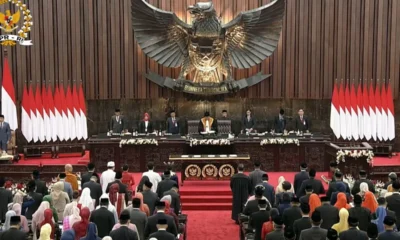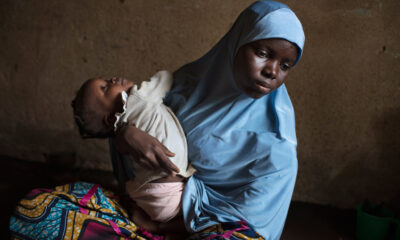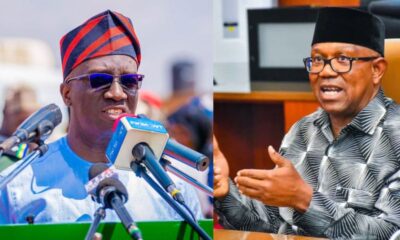Africa
The Silent Revolution Of Renewable Energy In West Africa -By Bintu Bashir Mustapha
Regional cooperation could also accelerate progress. The Economic Community of West African States (ECOWAS) has established the Centre for Renewable Energy and Energy Efficiency (ECREEE) to promote collaboration among member states. By sharing best practices, technology, and resources, countries can collectively overcome challenges and build a unified energy strategy. The integration of renewable energy into the West African Power Pool could further enhance cross-border electricity trade, ensuring that energy surpluses in one country benefit others in need.

Across West Africa, a silent but powerful revolution is transforming lives—renewable energy. From the dusty villages of Niger to the bustling streets of Lagos, solar panels, wind turbines, and bioenergy projects are gradually replacing diesel generators and unreliable power grids. This transition toward clean energy is not just about electricity—it is about empowerment, sustainability, and progress. For decades, millions of West Africans have lived without access to reliable power, limiting education, healthcare, and business opportunities. Now, renewable energy is emerging as the key to unlocking the region’s development potential.
Electricity access remains one of West Africa’s biggest challenges. According to the International Energy Agency (IEA), over 180 million people in the region still live without electricity, with rural communities being the hardest hit. National power grids are often outdated, poorly maintained, and unable to meet growing demand. In many countries, blackouts are a daily occurrence, disrupting schools, hospitals, and small businesses. Renewable energy offers a practical and affordable solution to this chronic energy poverty. By harnessing natural resources like sunlight, wind, and biomass, West African nations can create decentralized energy systems that reach even the most remote areas.
Solar power, in particular, has become the cornerstone of this energy transformation. With abundant sunlight year-round, the region holds immense potential for solar generation. Countries such as Nigeria, Ghana, and Senegal are leading the way with ambitious solar projects. Nigeria’s “Solar Power Naija” initiative, for instance, aims to provide five million new connections through solar home systems and mini-grids. In rural communities, solar lamps are replacing kerosene lanterns, reducing health risks and improving living conditions. Students can now study at night, and health clinics can store vaccines safely—small but life-changing benefits of clean energy access.
Wind and hydroelectric power are also gaining ground in parts of West Africa. Senegal and Cabo Verde have invested in wind farms that contribute significantly to their national grids. In Ghana and Côte d’Ivoire, small-scale hydro projects are helping to power local industries and farms. Meanwhile, bioenergy—produced from agricultural waste—is being explored as a renewable fuel source, particularly in farming communities. These diverse energy solutions demonstrate that West Africa is not limited to one approach; rather, it is building a flexible and sustainable energy mix suited to its unique environment.
The benefits of renewable energy go far beyond electricity generation. It is also creating new economic opportunities. The renewable energy sector is generating thousands of jobs—from installation technicians to maintenance engineers and entrepreneurs in green technology. In many cases, women and youth are at the forefront of this emerging industry. Initiatives like “Women in Renewable Energy Association” (WIRE-Africa) are empowering women with technical skills and leadership training, ensuring inclusivity in the green economy. By linking sustainability with employment, renewable energy is tackling both poverty and inequality simultaneously.
Environmental impact is another crucial aspect. West Africa, like the rest of the world, faces the consequences of climate change—rising temperatures, droughts, and floods that threaten livelihoods. Transitioning to renewable energy helps reduce carbon emissions and dependency on fossil fuels. For countries that rely heavily on fuel imports, clean energy also enhances energy security and reduces economic vulnerability. The shift to renewables, therefore, represents not just an environmental necessity but also a strategic advantage for national stability and independence.
However, the path to a fully renewable future is not without challenges. Financing remains a major obstacle, as many clean energy projects require high upfront costs. Bureaucratic red tape, lack of technical expertise, and inconsistent government policies have also slowed progress. In some cases, renewable energy equipment is imported at high costs, making it difficult for local entrepreneurs to scale up. Experts argue that governments must create enabling environments—through tax incentives, stable regulations, and investment in research—to attract more private and international funding.
Regional cooperation could also accelerate progress. The Economic Community of West African States (ECOWAS) has established the Centre for Renewable Energy and Energy Efficiency (ECREEE) to promote collaboration among member states. By sharing best practices, technology, and resources, countries can collectively overcome challenges and build a unified energy strategy. The integration of renewable energy into the West African Power Pool could further enhance cross-border electricity trade, ensuring that energy surpluses in one country benefit others in need.
Ultimately, renewable energy represents hope for a sustainable and equitable future. It holds the promise of lighting up homes, powering industries, and fueling innovation across West Africa. As governments, private investors, and citizens embrace this transition, the dream of universal electricity access is becoming a reality. The silent revolution of renewable energy is no longer just a technological shift—it is a social transformation that touches every aspect of life. In the glow of solar lights and the hum of wind turbines, West Africa’s future is beginning to shine brighter than ever before.
Bintu Bashir Mustapha is a 300 level student from Kashim Ibrahim University (Formerly Borno State University, Maiduguri)




























